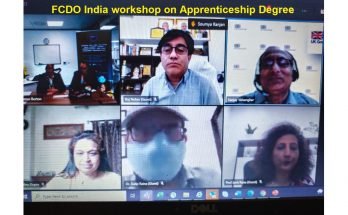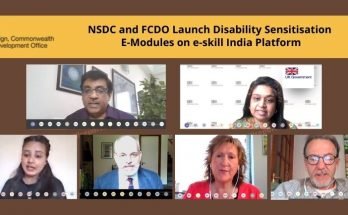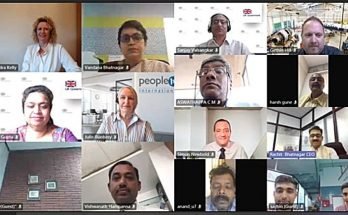The Skills for Jobs (SFJ) programme under the auspices of the Department of International Development (DFID), Government of United Kingdom in partnership with the Ministry of Skill Development and Entrepreneurship envisages a shift in paradigm for empowering the persons with disability. In partnership with the Skill Council for Persons with Disability (SCPwD), DFID organized a two-day “Training on Assistive Technology to Support Inclusive Practices” for the trainers of the Sector Skill Council for PwD and other organizations delivering training programs for PwDs. The training was conducted on 13th & 14th November 2019 in Mumbai and on 15th & 16th November 2019 in Delhi.
This training provided an exclusive platform for the trainers to engage with innovative technologies and their applications as an enabler for their trainings. The training was facilitated by the National Star College, an award-winning UK agency specialized in providing in training to PwDs.
The Delhi training has graced the presence of Mr. Sanjay Valsangkar, Department for International Development (DFID). He opened the session with the commitment of DFID towards partnering with the Skill India Mission and efforts made for mainstreaming the employment for PwDs. He also emphasized on the various UK best practices of organizations and how the same can be incorporated in India.
Mumbai training was attended by Mr. Anup Srivastava, Chief Executive Officer, Skills Council for Persons with Disability. He touched upon the issues of recruitments and their commitment to overcome the hurdles. The introductory session looked upon the nuances of discrimination and the areas of concerns for persons with disability.
The programme emphasized on the role of technology and demonstrated some stellar examples of the same. From the software’s like Microsoft translators to Claro-Lens and Office-Lense to Vevox, the training showcased a range of solutions which can be used by persons with sensory, physical, intellectual or learning disabilities. Participants were demonstrated on the usage of these technologies and facilitated participants to get first-hand experience on using these applications. Participants were urged to incorporate these applications in their training for a more impactful delivery. Adding to the seamless access that technology enables, participants were made aware of the ease of learning and implementation of these technologies.
With discussions on interlacing the technological solutions to the Indian context and the need for fostering them, the event ended with the trainers being more receptive to them. The participants discussed about the various challenges people with disabilities face in learning and the role of technology as an enabler in in learning process. They also discussed the challenges of using technology in teaching, training and employability, and what the areas of improvement. The event concluded with the participants being enriched their knowledge and technical knowledge for enhanced delivery of vocational skills to people with different sorts of disability.
Refer SkillReporter (www.SkillReporter.com) for skill development and The Edupress (www.TheEduPress.com ) for education related important News, Tenders, RFP, Jobs, EOI, Events, Announcements, Circulars, Notices and other useful updates. Content also shared on Facebook Twitter Linkedin



